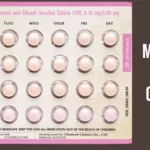
Jane Doe, a 32-year old accountant living in Ohio, never expected to become pregnant after having Nexplanon implanted. She had been using the contraceptive implant without any issues for over 3 years when she was surprised to find out she was already 5 months pregnant during a routine doctor’s visit.
“I was absolutely shocked when the doctor told me I was pregnant. I hadn’t had any symptoms at all and my period had remained light, which I assumed was normal with Nexplanon. I couldn’t believe I was almost ready to give birth!” Jane said.
While Jane didn’t experience morning sickness or other common pregnancy symptoms, she did notice some subtle changes in her body that she attributed to getting older or gaining a little weight. She also felt some fluttering sensations that she thought were just gas.
Jane delivered a healthy baby boy just 2 months later. While the pregnancy was unplanned, Jane embraced motherhood and is thankful that both she and her son were perfectly healthy despite the surprise. She hopes her story will remind other women to be vigilant about replacing Nexplanon when it expires.
Related: 8 Best Ways To Avoid Pregnancy Naturally
How Nexplanon Birth Control Works
Nexplanon is a small, thin rod about the size of a matchstick that is implanted under the skin of the upper arm. It releases a continuous dose of a synthetic progesterone called etonogestrel to prevent pregnancy.
Progesterone works in a few key ways:
- It prevents the ovaries from releasing eggs, thereby stopping ovulation. Without an egg, pregnancy cannot occur.
- It thickens the mucus around the cervix, making it difficult for sperm to enter the uterus.
- It thins the uterine lining, hampering embryo implantation.
The Nexplanon implant provides continuous pregnancy prevention for up to 3 years after insertion. After 3 years, the levels of etonogestrel drop and the implant expires. At this point, it should be removed and replaced with a new Nexplanon rod to maintain contraceptive coverage.
Related: True Stories of Pregnancy after Tubal Ligation
What Happens When Nexplanon Expires
Nexplanon contains the hormone progesterone, which works to prevent pregnancy in a few key ways. First, it stops ovulation, so no egg is released. It also thickens cervical mucus to prevent sperm from reaching an egg. Finally, it thins the uterine lining, making it unfavorable for an embryo to implant.
When Nexplanon expires after 3 years, these effects begin to wear off. The implant slowly releases less and less progesterone over time. As the hormone levels decline, ovulation may start back up again. Cervical mucus could become thinner and more penetrable by sperm. The uterine lining could also thicken back to a state that supports implantation.
The timing of these changes is unpredictable and varies from woman to woman. Some may notice their cycles returning within months of expiration, while others remain protected longer. Since the decrease in hormone levels happens gradually, it’s difficult to pinpoint exactly when one becomes vulnerable to pregnancy again.
The takeaway is that expiration dates exist for a reason. After 3 years, Nexplanon can no longer be relied upon to prevent pregnancy like it once did. One should never assume they are still protected by an expired implant.
Related: Weight Gain after Stopping Birth Control
Potential Symptoms of Pregnancy with Expired Nexplanon

Once Nexplanon has expired, the levels of the hormone progestin in a woman’s body will steadily decline. As a result, she may start experiencing pregnancy symptoms as early as 3-4 weeks after conception. Some potential early signs of pregnancy to be aware of include:
- Missed or Light Period: One of the first hints of pregnancy is a missed or unusually light period. Irregular bleeding is common with Nexplanon, so a missed period may not raise alarm bells right away. But take note if you go longer than normal without a period.
- Nausea: Morning sickness affects up to 80% of pregnant women. Nausea, sometimes with vomiting, is one of the most tell-tale pregnancy symptoms. It often starts around week 6 but can begin sooner.
- Breast Tenderness: Increased blood flow and hormonal fluctuations during early pregnancy often lead to sore, tingly, or swollen breasts. This symptom may start as soon as 1-2 weeks after conception.
- Fatigue: Feeling very tired is common in early pregnancy. This exhaustion is due to rising progesterone levels and metabolic changes.
- Abdominal Cramping: Some women experience mild abdominal cramping in the first weeks of pregnancy. This may feel similar to premenstrual cramps.
- Low Back Pain: Hormone shifts and constipation can trigger mild back pain early in pregnancy for some women. This often goes away during the second trimester.
- Headaches: Spiking estrogen and progesterone can cause headaches, especially in the first trimester. Dehydration and low blood sugar may also play a role.
- Food Aversions: A sudden dislike of certain foods like coffee, eggs, meat, etc can be an early sign of pregnancy. Morning sickness and a heightened sense of smell contribute.
Related: Acne after Stopping Birth Control
The Emotional Impact
Discovering you are unexpectedly pregnant can be an extremely emotional experience, especially when using a contraceptive method you believed was reliable. Feelings of shock, fear, confusion, anger, guilt, and more are all very normal reactions.
It’s important to remember that this situation is not your fault. Nexplanon is over 99% effective for up to 3 years when used properly. An unintended pregnancy does not mean you did something wrong or were irresponsible. Sometimes contraceptives simply fail.
Give yourself grace and understanding during this emotional rollercoaster. Your feelings are valid, and you have support. Reach out to loved ones, seek counseling if needed, and know that you are not alone. Thousands of women face unplanned pregnancies each year, even when using contraception.
The most urgent step is to confirm the pregnancy and seek prenatal care right away. But after that medical priority, take things one day at a time and get the emotional support you need. This confusing situation can ultimately have a positive outcome with the right care for both you and your baby.
Related: What are the Chances of Getting Pregnant after Stopping Birth Control?
Steps to Prevent Unintended Pregnancy
The key to avoiding an unintended pregnancy with Nexplanon is being proactive. Here are some important steps you can take:
- Get Nexplanon replaced every 3 years – Nexplanon is effective for 3 years after insertion. Schedule an appointment with your healthcare provider to have it replaced on time. Mark your calendar so you don’t forget.
- Discuss switching methods with doctor if desired – If you want to transition to a different birth control method when your Nexplanon expires, make an appointment with your doctor 3-6 months prior to discuss options. This ensures no gap in coverage.
- Track cycles and watch for changes after expiration – Nexplanon can mask the signs of your normal menstrual cycle. After it expires, pay close attention to your cycle and note any changes like spotting or cramping that could indicate ovulation. Take a pregnancy test if anything seems abnormal.
- Take pregnancy test if any concerns – If you notice possible pregnancy symptoms, or just feel “different,” take a pregnancy test right away. Finding out early means more options and the best care.
Being proactive about birth control and tracking your body’s signals can go a long way towards preventing surprise pregnancies. Discuss any concerns with your healthcare provider.
When to Seek Medical Care
If you suspect you may be pregnant while using an expired Nexplanon implant, it is important to seek medical care promptly. Some key times to see your doctor include:
- If pregnancy is suspected: See your doctor right away to confirm if you are pregnant and discuss next steps. Getting an early pregnancy test is important, as your doctor can advise you on all available options.
- To discuss birth control options: Make an appointment with your healthcare provider to explore switching to a new birth control method if Nexplanon is no longer right for you. Together, you can find the best contraceptive choice to meet your needs going forward.
- If severe abdominal pain or bleeding: Schedule an urgent care visit if you experience concerning symptoms like severe cramping, pelvic pain, or heavy vaginal bleeding. These could potentially indicate an ectopic pregnancy or other complication that requires prompt medical attention.
Do not delay seeking care if any unusual symptoms arise. Your doctor is there to support you through this process and ensure you get the care you need. With the right medical guidance, you can address an unplanned pregnancy safely and make informed choices for your health.
Coping with an Unplanned Pregnancy
Discovering you’re pregnant when you didn’t intend to be can be emotionally devastating. It’s important to know that you have options and support available.
The first step is to schedule an appointment with your healthcare provider as soon as possible to confirm the pregnancy and discuss next steps. Getting early prenatal care is crucial, even if you are undecided about continuing the pregnancy. Your provider can advise you on all of your options.
You may choose to continue the pregnancy and parent the child yourself. Or you may decide to make an adoption plan and place the baby with a family who is hoping to adopt. There are also pregnancy crisis centers and adoption agencies that can walk you through the adoption process if you choose this option.
Abortion is also an option to end the pregnancy in the first trimester or early second trimester. If you are considering this, don’t delay – there are limits on when surgical and medication abortions can be performed based on state laws and the stage of pregnancy. Your provider can give you specific medical advice about what options you have available.
No matter what you decide, you don’t have to cope alone. Turn to your loved ones, a counselor, pregnancy crisis center, place of worship, or support group. Having people you trust to lean on can help you get through this challenging time. With help, care, and compassion, you can make the decision that is right for you.
You Are Not Alone
While an unexpected pregnancy with expired Nexplanon can feel isolating, you are not alone in this experience. Studies estimate that Nexplanon fails in about 0.05% of women during the first year of use. With over a million women using this contraceptive implant, many have found themselves facing an unintended pregnancy.
Here are some stories from women who have gone through this:
Sarah, age 27, had used Nexplanon for 5 years with no issues. But a few months after it expired, she started experiencing breast tenderness, nausea, and a missed period. A pregnancy test confirmed she was 7 weeks along. “I was in total disbelief. I never expected Nexplanon to fail me,” she says.
Amanda, 33, had her Nexplanon replaced on schedule every 3 years. After her most recent replacement, she noticed irregular bleeding but dismissed it as normal side effects. It wasn’t until she was 16 weeks pregnant that she realized something was very wrong. “My doctor insisted Nexplanon was basically foolproof. I felt so betrayed and afraid,” Amanda recounts.
While getting pregnant with an expired implant can be alarming, these women’s stories are far from unique. Thousands have dealt with the confusion, fear, and challenges of an unexpected Nexplanon pregnancy. By sharing their experiences, many have found solace and support from others who truly understand. You do not have to cope with this alone.
The Takeaway
The key points to remember are to be aware of Nexplanon’s expiration date and replace it on time, know the signs and symptoms of a possible unintended pregnancy, and seek medical care promptly if you have any concerns. An expired Nexplanon may lead to reduced effectiveness as birth control. However, with proactive planning and open communication with your doctor, you can prevent an unplanned pregnancy.
Don’t ignore symptoms or changes you notice in your body – consult your healthcare provider right away if your period is late, you have unusual cramping, nausea, or fatigue. It’s better to be safe than sorry when it comes to your reproductive health. You deserve to feel informed, empowered, and in control of your family planning.
While an unexpected pregnancy can be shocking and emotional, you don’t have to go through it alone. There are medical professionals and support systems available to help guide you through your options and next steps. The most important thing is that you get the care you need, both physically and emotionally. Stay strong, be kind to yourself, and don’t be afraid to ask questions. Your health, comfort, and peace of mind should always come first.






